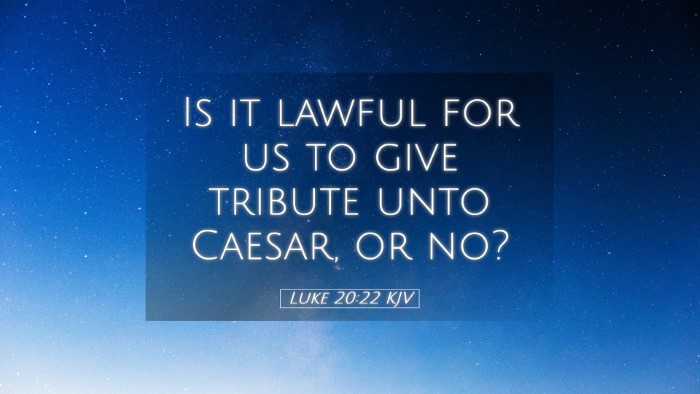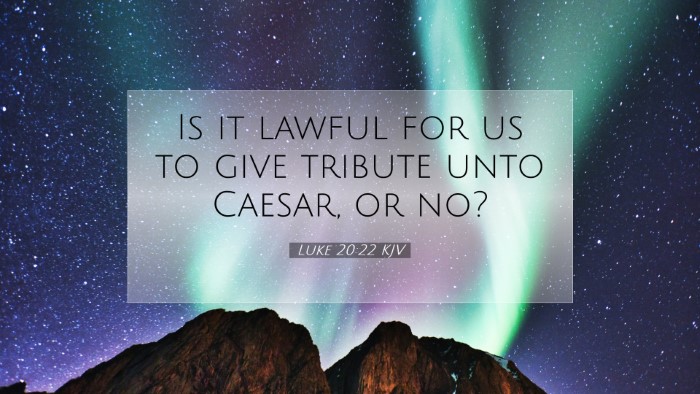Commentary on Luke 20:22
Luke 20:22 states: "Is it lawful for us to give tribute unto Caesar, or no?" This question posed by the Pharisees to Jesus is laden with political and theological significance. It reflects the tension between the Roman authorities and the Jewish populace, as well as the profound implications regarding the nature of allegiance, authority, and divine governance.
Contextual Background
The query takes place during an intense period of ministry in Jerusalem, shortly before Jesus’ crucifixion. The Pharisees and Herodians unite against Jesus, revealing their desperate attempts to undermine Him. This coalition is quite fascinating, as the Pharisees were traditionally opposed to Roman rule, while the Herodians supported it. Thus, their unified question represents a strategic maneuver to entrap Jesus.
The Question: Political and Theological Implications
The heart of the question asks whether it is lawful to pay taxes to Caesar. The implications of answering this question are profound:
- Political Consequences: If Jesus advocates for taxation, he risks alienating the Jewish people who resent Roman occupation.
- Theological Dimensions: Denying the legality of paying taxes could render Jesus an insurrectionist in Roman eyes, potentially leading to His arrest.
Insights from Public Domain Commentaries
Matthew Henry's Commentary
Matthew Henry emphasizes the intricate trap posed by the question, illustrating the wisdom of Christ in avoiding manipulation. He notes that the question reflects a superficial religiosity that seeks to divide secular and sacred authorities. Henry highlights that Jesus’ eventual answer showcases His authority to transcend both realms of governance.
Albert Barnes' Notes
Barnes discusses the historical setting concerning the tribute tax and the coin used for payment, the denarius, which bore the image of Caesar. He articulates that the very act of carrying the coin signifies implicit acknowledgment of Roman authority. Barnes highlights that the payment of tribute is a direct acknowledgment of civil authority, which poses an inherent conflict with the theocratic aspirations of the Jewish people.
Adam Clarke’s Commentary
Adam Clarke provides a more extensive examination of the economic implications of taxation. He discusses the heavy taxation imposed by Rome and the burden it placed on the Jewish populace. Clarke points out that to refuse payment could not only provoke Roman wrath but also lead to civil disorder among the Jewish communities. His insights accentuate Jesus’ shrewdness in navigating these perilous waters with divine insight.
The Response of Jesus: "Render Therefore..."
Jesus responds to the inquiry with remarkable wisdom by saying, "Render therefore unto Caesar the things which be Caesar's, and unto God the things which be God's." This answer effectively sidesteps the trap while presenting a profound theological principle on dual citizenship:
Dual Authority and Responsibilities
Jesus outlines the necessity of honoring both earthly authorities and divine commands. This dichotomy indicates that while believers have earthly obligations, these do not absolve them of their higher responsibility to God.
- Earthly Authority: Jesus acknowledges the legitimacy of civil governance, reinforcing the principle of order in society.
- Divine Authority: The greater claim belongs to God, suggesting that ultimate allegiance resides in the divine realm.
Theological Reflections
This passage invites deeper theological reflections. The interplay of faith and governance remains a recurring theme throughout Scripture, encouraging believers to navigate the complexities of life within secular systems while remaining grounded in their spiritual commitments.
Application for Pastors and Theologians
Pastors and theologians can draw substantial lessons from this encounter:
- Engagement with Culture: Just as Jesus engaged a politically charged question, believers today are called to engage contemporary issues with wisdom and grace.
- Stewardship of Dual Citizenship: Christians must recognize their responsibilities to both their earthly governments and their divine Lord, understanding that each requires fidelity.
- Wisdom in Adversity: The need for discernment in navigating potential conflicts between faith and societal demands is crucial for church leaders today.
Conclusion
Luke 20:22 is a profound verse that encapsulates the essence of Jesus' lordship over both the secular and sacred dimensions of life. The commentary provided by esteemed theologians underscores the complexities faced by Jesus, highlighting His wisdom in addressing their challenge. For pastors, students, and scholars, this passage serves as a compelling reminder of the delicate balance that must be maintained between obeying earthly authorities and remaining steadfast in one’s commitment to God.


